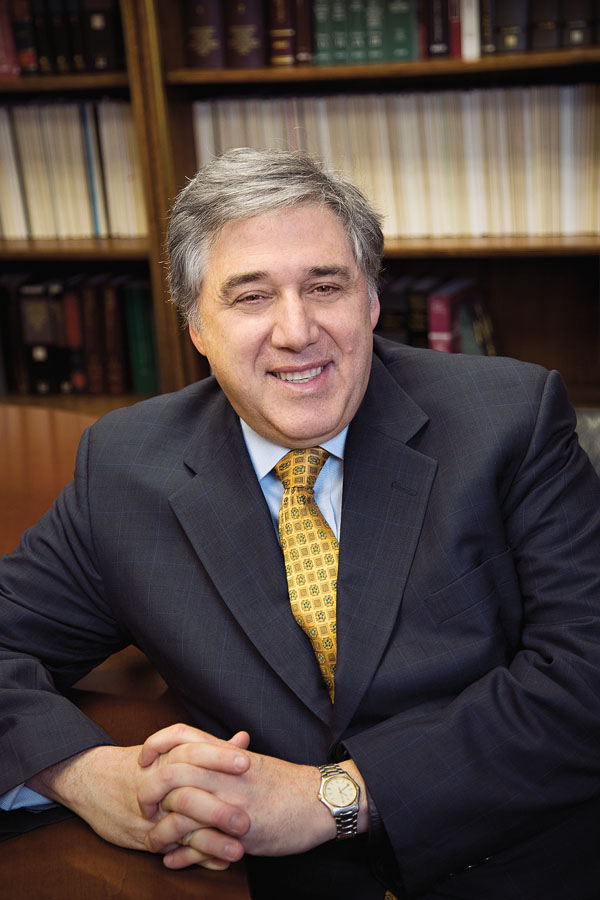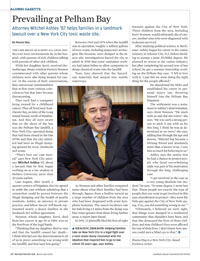Alumni Gazette
 IDEALISTIC ENDEAVOR: Helping families take on New York City in a legal fight over a toxic waste dump resonated with the idealism
that inspired him to go to law school 20 years ago, says Ashley. (Photo: Shannon Taggart for Rochester Review)
IDEALISTIC ENDEAVOR: Helping families take on New York City in a legal fight over a toxic waste dump resonated with the idealism
that inspired him to go to law school 20 years ago, says Ashley. (Photo: Shannon Taggart for Rochester Review)The case began as almost all legal battles over toxic environments do, in the hospital, with parents of sick children talking with parents of other sick children.
While her daughter, Kerri, received chemotherapy, Bronx resident Patricia Nonnon commiserated with other parents whose children were also being treated for cancer. In the course of their conversations, they uncovered commonalities that at first were curious coincidences but that later became disconcerting.
They each had a youngster being treated for a childhood cancer. They all lived near Eastchester Bay, an inlet of the Long Island Sound, north of Manhattan. And they all were aware that on the shore of the bay was the Pelham Bay landfill, a New York City–operated dump that had been closed in the late 1970s and that the city admitted had been an illegal dumping ground for toxic chemicals and waste.
“That’s how our case started,” says New York City attorney Mitchel Ashley ’87, about a lawsuit that he first began working on as a law student at Hofstra University more than 20 years earlier.
Last August, after nearly a quarter century of litigation, the city agreed to settle the case without admitting that a connection could be proven between the illegal dumping and the health of nearby residents. Ashley, an attorney in private practice, and fellow lawyer Jeff Korek represented nearly a dozen families in the landmark $12 million agreement.
Nonnon, whose daughter, Kerri, died from her cancer at age 10 in 1989, was on the forefront of the legal battle.
“Thinking that my daughter died in vain and that the landfill caused her death— I think Mitchel saw the determination in all of us to prove something was wrong with the landfill, and that kept him going.”
Between 1963 and 1978 when the landfill was in operation, roughly a million gallons of toxic waste, including suspected carcinogens like benzene, were dumped at the 81-acre site. Investigations forced the city to admit in 1985 that some sanitation workers had taken bribes to allow companies to dump chemical waste into the landfill.
Tests later showed that the hazardous materials had seeped into nearby waterways.
As Nonnon and other families compared notes about what their families had been through, figures from a hotline turned up a large number of children from the area who had been diagnosed with acute lymphatic leukemia. The cancer incidence rate for kids living 1.5 miles from the dump was four times greater than those living farther away, a report later found.
In 1991, 12 plaintiffs filed the first of eight lawsuits against the City of New York. Three children from the area, including Kerri Nonnon, would ultimately die of cancer; another nine who were diagnosed with leukemia survived.
After studying political science at Rochester, Ashley began his career in the casino industry in Atlantic City, N.J., before deciding to pursue a joint JD/MBA degree. He planned to return to the casino industry, but
fter completing his second year of law school, he got a summer internship working on the Pelham Bay case.
“I fell in love with it. I just felt we were doing the right thing for the people affected.”
He abandoned his MBA and established his career in personal injury law, throwing himself into the Pelham Bay litigation.
The settlement was a testament to Ashley’s determination, says client Nonnon.
“He stuck with us and did not waver,” she says. “He was such a strong person to stick it out with us for this long. I think he was as determined as we were,” she says, adding that through the ups and downs, “Mitchel has become a lifelong friend and absolutely more than a lawyer to us. I owe him so much for believing in us.”
Ashley says the notion that he had a chance to protect people who faced overwhelming odds was part of his motivation through the long, challenging case.
“I got involved in the case as a very young idealistic law student,” he says. “To some degree, I never lost that. These people are exactly the type of people that you want to get involved in this type of profession to protect—they were the little guy against the City of New York saying, ‘City, you did something wrong to me.’ ”
“Ultimately, I believed we were right, that things were dumped in a residential community that shouldn’t have been, and that this destroyed the lives of three children, and nine children’s lives were affected for rest of their lives. I don’t know how anyone could turn a blind eye to that.”
Husna Haq is a New York City–based freelance writer.

